The sound of a ticking clock, the weight of an open textbook, and the ever-present fear of failure—these are familiar experiences for millions of students preparing for exams.
Exam stress is a universal phenomenon, affecting students of all ages, from primary school children to university graduates.
While a certain level of stress can be beneficial—enhancing focus, motivation, and performance—excessive stress can have devastating consequences.
It can lead to anxiety, depression, burnout, and even long-term health issues.
For parents and teachers, exam stress presents a critical challenge. On one hand, they want students to excel academically and secure a bright future.
On the other, they are often confronted with the emotional and physical toll that relentless academic pressure can inflict.
Reports of students experiencing severe breakdowns, panic attacks, and extreme mental pressure due to exams are not uncommon. In India, for instance, the National Crime Records Bureau (NCRB) reported that more than 13,000 students died in 2021 due to academic stress, averaging over 35 students per day.
Teachers, bound by rigid curricula, may find themselves pushing students harder, fearing that underperformance will reflect poorly on both the student and the school.
A study conducted by the American Psychological Association (APA) found that students experiencing chronic academic stress performed significantly worse on memory recall tasks compared to their less stressed peers.
At its core, education should be about curiosity, growth, and self-discovery—not just grades and rankings. By addressing exam stress with empathy and science-backed solutions, we can create an academic environment where students thrive, not just survive.
Understanding Exam Stress: When Pressure Becomes Overwhelming
In a world where academic success is often equated with self-worth, exam stress has become an unavoidable reality for students.
The fear of failing, the burden of expectations, and the ticking clock of an impending test can trigger an overwhelming sense of pressure. But what exactly is exam stress, and why does it affect students so profoundly?
What is Exam Stress?
Exam stress is a psychological and physiological response triggered by the pressure of performing well in academic assessments.
Scientifically, it is associated with the activation of the hypothalamic-pituitary-adrenal (HPA) axis, which leads to the release of cortisol, the body’s primary stress hormone.
Psychologists often differentiate between eustress (positive stress) and distress (negative stress). Eustress occurs when a manageable level of stress enhances motivation and performance.
A study published in the journal Psychoneuroendocrinology found that students who exhibited chronic stress before exams had significantly higher cortisol levels, impairing their ability to recall information.
Why Do Students Experience Exam Stress?
Exam stress is not just about the test itself—it is shaped by a complex mix of psychological, social, and educational factors.
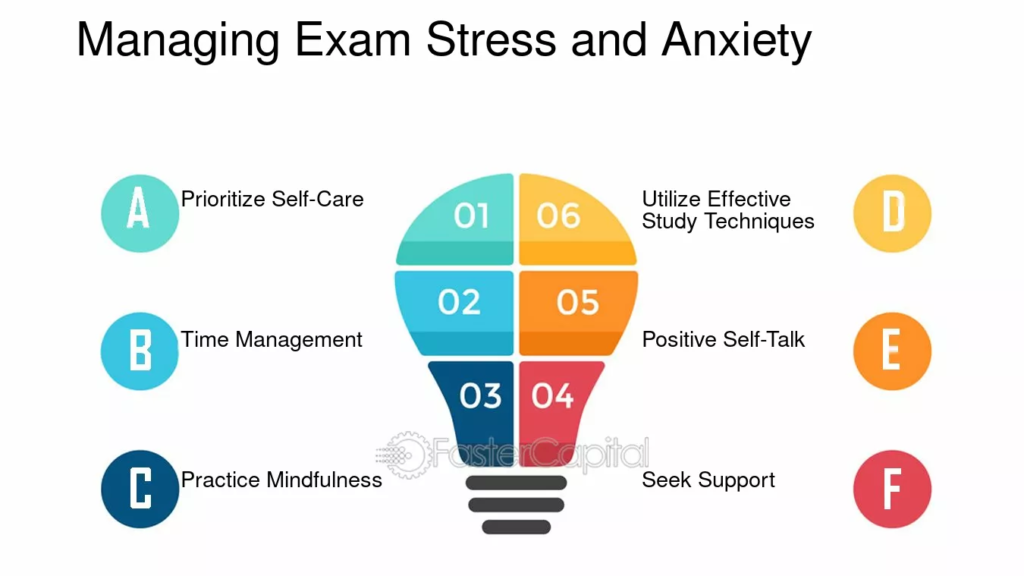
This image illustrates six key strategies for managing exam stress and anxiety. These include self-care, time management, mindfulness, seeking support, positive self-talk, and effective study techniques, all of which contribute to better academic performance and well-being.
The Burden of Academic Pressure
For many students, academic success is not just a personal goal but a family expectation. Parents, in their desire for their child’s success, sometimes place unrealistic demands on performance.
This pressure is particularly intense in cultures where exams determine future career paths.
In India, for instance, competitive exams like the IIT-JEE and NEET are often seen as life-altering, making failure seem catastrophic.
Similarly, in South Korea, students preparing for the university entrance exam, Suneung, study for years under immense pressure, with mental health concerns on the rise.
Examination Stress and Anxiety Among College Students
Examination stress is a common issue among college students, often leading to anxiety and negatively impacting academic performance. The pressure to excel, coupled with inadequate preparation and study techniques, contributes to heightened stress levels.
A study on college students from different academic streams—Arts, Science, and Commerce—revealed that Arts students experience the highest levels of stress and anxiety, followed by Commerce students, while Science students report comparatively lower stress. The study also found that both undergraduate and postgraduate students experience similar levels of examination-related stress, indicating that academic level does not significantly alter stress perception.
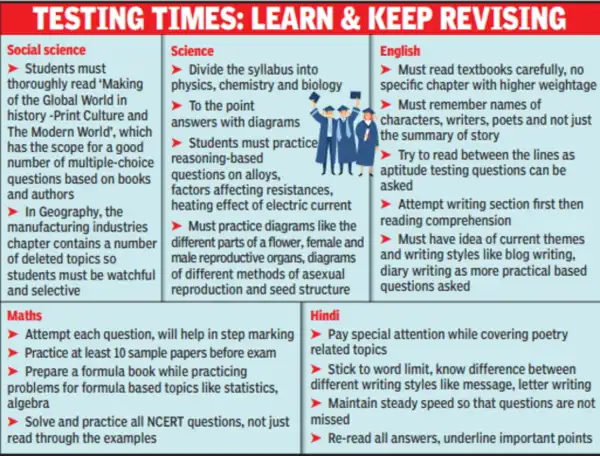
This image provides subject-wise revision tips for students preparing for exams, covering Social Science, Science, English, Maths, and Hindi. It emphasizes key strategies like practicing diagrams, focusing on deleted topics, solving sample papers, and understanding question patterns.
Factors such as high parental expectations, fear of failure, and ineffective study habits play a crucial role in increasing anxiety. While moderate stress can enhance motivation and performance, excessive stress can lead to adverse effects such as memory loss, panic attacks, and poor concentration during exams. To mitigate examination stress, students should adopt better time management, efficient study techniques, and relaxation strategies.
Additionally, reforms in the examination system, such as continuous assessment and flexible evaluation methods, could help reduce stress and promote better learning outcomes.
The Impact of Exam Stress on Learning and Memory
Examinations play a crucial role in assessing students’ knowledge, but they also introduce significant stress, which can influence learning outcomes. Stress during exams affects memory formation, sometimes hindering students from recalling information effectively.
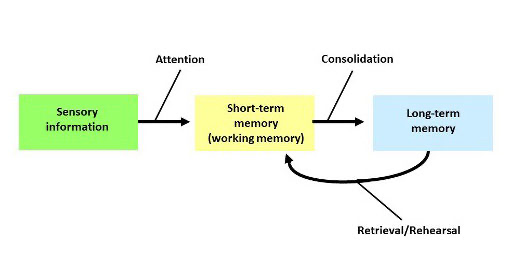
This image illustrates the memory process, where sensory information enters short-term memory through attention and is stored in long-term memory through consolidation. Retrieval and rehearsal help reinforce learning.
Research suggests that the way assessments are impacts how students study and retain knowledge. Traditional exams, which focus on factual recall, may lead to surface learning, whereas assessments that encourage analysis and application foster deeper understanding. The timing of stress is also critical—if stress occurs during knowledge acquisition, it can either enhance or impair memory consolidation depending on the individual and the context.
Chronic stress, in particular, has been linked to anxiety, reduced concentration, and even long-term negative effects on cognitive abilities. To create an effective learning environment, educators should design assessments that promote critical thinking rather than rote memorization.
Additionally, helping students manage stress through mindfulness, structured study plans, and a supportive atmosphere can improve academic performance. By recognizing the relationship between stress and learning, educators can develop assessment methods that not only evaluate students effectively but also contribute to their cognitive growth and emotional well-being. Creating a balanced approach to exams ensures that learning remains meaningful, productive, and sustainable.
Reducing Test Anxiety for Better Student Well-being
Test anxiety is a significant challenge for students, especially those preparing for high-stakes exams like the GCSEs. High anxiety levels can negatively impact academic performance, self-esteem, and overall mental health. To address this, educational psychologists developed the “Every Little Helps” (ELH) framework, a school-based intervention combining cognitive-behavioral techniques, relaxation strategies, and academic skill-building.
A study involving Year 11 students in the UK found that participation in ELH sessions led to reduced anxiety, improved emotional regulation, and better academic outcomes. Students also reported feeling more in control of their stress and applying these strategies beyond test situations. The study highlights the importance of school-based interventions in helping students manage stress and perform better academically.
By implementing structured support programs, schools can create a more positive learning environment and equip students with essential coping skills, ultimately enhancing both their academic success and overall well-being.
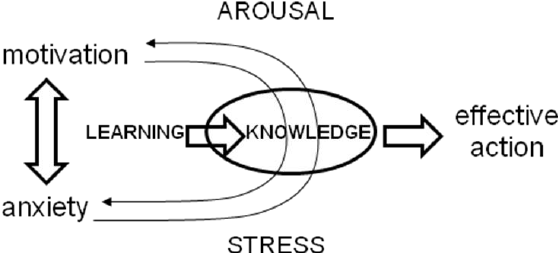
This diagram illustrates the relationship between learning, knowledge, and effective action, influenced by motivation, anxiety, arousal, and stress. It suggests that balanced arousal and stress can enhance motivation, leading to better learning outcomes.
Fear of Failure and Societal Expectations
Failure in academics is often stigmatized rather than seen as a learning experience. The idea that a single poor performance could derail future success leads to catastrophic thinking—where students believe that failing one exam equates to failing in life.
This fear is reinforced by society’s obsession with rankings and grades, often displayed publicly in schools or in media.
In countries like China, where the Gaokao exam determines university placement, students experience extreme stress, sometimes studying up to 14 hours a day.
Peer Comparisons and Competitive Culture
Social comparison is another major contributor to exam stress. In the digital age, where academic achievements are often shared online, students are constantly measuring themselves against their peers. Seeing a classmate’s high score on a practice test or hearing about a friend’s academic achievements can trigger self-doubt and impostor syndrome.
Studies conducted at the University of California, Berkeley, found that students in competitive environments reported higher stress levels, even when their own performance was objectively good. The fear of lagging behind others—rather than personal progress—often drives students into unhealthy study habits.
Overloaded Curriculum and Time Constraints
Modern education systems demand more than ever before. Syllabuses are packed with content, assignments, and extracurricular expectations, leaving little room for rest. The sheer volume of material students must master can feel insurmountable, especially when exams are frequent.
A study conducted at Harvard University found that students who followed high-intensity study schedules without breaks had lower retention rates compared to those who spaced out their learning over time. However, in many schools, students are expected to cram large amounts of information in short periods, often leading to mental fatigue.
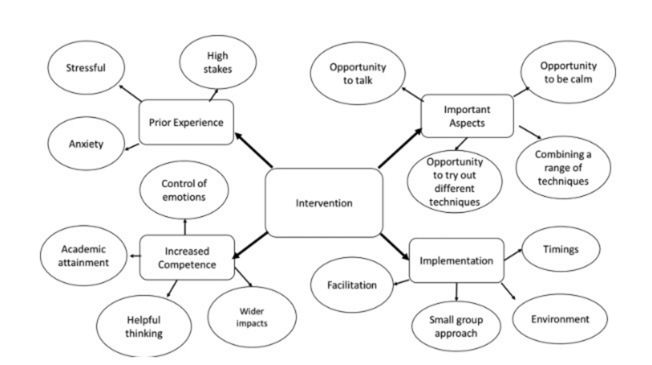
This image presents a mind map of “Intervention,” exploring its key components like prior experience, important aspects, implementation, and facilitation. It highlights factors such as anxiety, control of emotions, small group approaches, and opportunities to try different techniques.
Research Findings on Exam Stress Triggers
Several studies have highlighted the common stress triggers among students:
A 2020 study published in the journal Stress & Health found that students who perceived exams as high-stakes experienced significantly higher levels of anxiety, irrespective of their actual performance. This suggests that stress is often driven by perception rather than reality.
A report from the World Health Organization (WHO) stated that adolescents who study for more than five hours a day without breaks exhibit signs of chronic stress, including insomnia and digestive issues. This supports the idea that long hours do not always translate to effective learning.
A survey conducted by the National Union of Students (NUS) in the UK found that 80% of university students felt overwhelmed by academic stress, with 33% considering dropping out due to exam pressure. This highlights how stress, when unchecked, can lead to long-term disengagement from education.
The Impact of Excessive Exam Stress: When Pressure Takes a Toll
Research has shown that when stress levels cross a certain threshold, they stop being helpful and start becoming harmful, impacting not just academic performance but overall well-being.
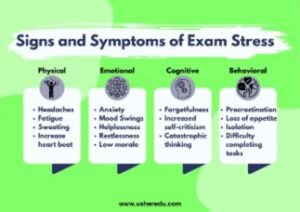
A study conducted by the University of Cambridge found that nearly 70% of students reported experiencing “crippling anxiety” before an important exam. This anxiety is not just a passing nervousness; it can manifest as heart palpitations, dizziness, excessive sweating, and even shortness of breath—classic symptoms of an anxiety disorder.
This image highlights the signs and symptoms of exam stress, categorized into Physical, Emotional, Cognitive, and Behavioral aspects. It includes symptoms like headaches, anxiety, forgetfulness, and procrastination, helping students recognize stress-related issues.
Psychological Effects: The Hidden Burden
A study published in the Journal of Clinical Sleep Medicine found that students who slept fewer than six hours before an exam performed significantly worse than those who had a full night’s rest. Lack of sleep affects memory consolidation, cognitive function, and emotional regulation, making it harder for students to retain what they have studied.
Physical Effects: When the Body Fights the Mind
The effects of excessive exam stress are not confined to the mind—they extend to the body as well. Stress triggers the body’s “fight or flight” response, which was originally meant to help humans escape danger.
Long-term stress also has a detrimental effect on the immune system. Studies have shown that students under extreme academic stress are more prone to illnesses such as colds, fevers, and even digestive issues. A report published by the American Psychological Association (APA) confirmed that chronic stress weakens the body’s ability to fight infections, making students more vulnerable to falling sick right before exams.
Another concerning effect is the increased heart rate and muscle tension that students experience due to prolonged stress. When stress hormones flood the bloodstream, the heart starts beating faster, and muscles tighten as if preparing for a physical challenge.
Behavioral and Social Effects: The Silent Changes in Personality
Beyond mental and physical health, exam stress also alters behavior and social interactions, often in ways that go unnoticed until they become serious. Irritability and mood swings are common responses to stress. Parents and teachers may notice that students become more impatient, easily frustrated, or withdrawn.
Perhaps one of the most dangerous consequences of excessive exam stress is the increased likelihood of adopting unhealthy coping mechanisms. When students feel overwhelmed, they often turn to short-term solutions that provide temporary relief but have long-term negative effects.
Exam stress is not just a temporary phase that students should “get over”—it is a serious issue that affects mental, physical, and social well-being. From anxiety disorders and sleep deprivation to weakened immune systems and social withdrawal, the effects of chronic stress extend far beyond the exam hall.

This image provides useful tips for dealing with exam stress, emphasizing the importance of relaxation, exercise, healthy eating, sufficient sleep, and recognizing achievements. It encourages a balanced approach to studying for better well-being and performance.
How Parents and Teachers Can Help Manage Exam Stress
The pressure of exams can often feel like an insurmountable mountain for students, but the right guidance from parents and teachers can make a world of difference. While stress is a natural response to academic challenges, excessive stress can have long-term negative effects on a child’s mental, physical, and emotional well-being.
By fostering the right mindset, providing emotional support, promoting a balanced lifestyle, and teaching effective study strategies, we can help students not only survive exams but also thrive academically and personally.
Encouraging a Healthy Mindset: Growth Over Grades
Dr. Carol Dweck, a renowned psychologist from Stanford University, conducted extensive research on the impact of mindset on learning. She found that students with a fixed mindset—those who believe intelligence is static—tend to avoid challenges and fear failure.
On the other hand, students with a growth mindset see failure as an opportunity to learn and improve. Encouraging students to focus on their effort rather than just results can significantly reduce anxiety and improve academic outcomes.
For example, instead of saying, “You need to get an A in math,” parents and teachers can say, “I’ve seen how hard you’re working, and I’m proud of your effort.” Such small shifts in language can help students see exams as a part of the learning journey rather than a make-or-break moment.
Providing Emotional Support: The Power of Open Conversations
Many students bottle up their stress, fearing they will be judged or dismissed. Creating an environment where they feel safe to express their concerns is critical. Research has consistently shown that students who have strong emotional support from parents and teachers perform better academically and experience lower levels of stress.
A study published in the Journal of Adolescence found that students who had open communication with their parents about academic stress were less likely to develop anxiety disorders and depression. When students know that their concerns will be met with empathy rather than criticism, they are more likely to seek help when needed.
Promoting a Balanced Lifestyle: The Science of Well-being
Sleep is one of the most important factors in stress management. A study by Harvard Medical School found that students who get at least 7-9 hours of sleep before an exam perform better than those who stay up late cramming. Sleep helps consolidate memory and improves problem-solving skills. Parents should encourage a consistent sleep schedule, even during exam season.
Nutrition plays a significant role in brain function. Foods rich in omega-3 fatty acids (such as walnuts and salmon), antioxidants (found in berries), and proteins (such as eggs and lentils) have been shown to improve concentration and memory. On the other hand, excessive caffeine and junk food can lead to energy crashes and worsen anxiety.
Physical activity is a natural stress reliever. Exercise releases endorphins—hormones that improve mood and reduce stress. Even short breaks for a walk, stretching, or a few minutes of deep breathing can significantly lower anxiety levels. Schools and parents should encourage students to engage in physical activities, even during exam season.

This infographic explores the impact of stress on students, highlighting its effects on academic performance, physical and mental health. It also identifies major causes of stress and provides practical strategies for managing it effectively.
Teaching Time Management and Study Skills: Learning Smarter, Not Harder
One of the biggest contributors to exam stress is poor time management. Many students either procrastinate until the last minute or try to study everything at once, leading to mental exhaustion and decreased retention. Instead of encouraging long hours of studying, parents and teachers should introduce scientifically proven study techniques that make learning more effective.
The Pomodoro Technique: Research has shown that studying in short, focused intervals (25-30 minutes) followed by 5-minute breaks helps improve concentration and reduces burnout. This method ensures that students remain productive without overwhelming themselves.
Spaced Repetition: Studies have found that reviewing information at intervals over several days helps strengthen memory retention. Instead of cramming, students should be encouraged to revise key concepts periodically.
Structured Revision Plans: A study by the University of California found that students who followed a structured study plan were 40% less likely to experience exam-related anxiety compared to those who studied randomly.
How Students Can Cope with Exam Stress Themselves
Exams are an inevitable part of student life, and so is the stress that comes with them. While some level of stress can be beneficial—pushing students to stay motivated and work hard—excessive stress can become overwhelming, leading to anxiety, fatigue, and even burnout.
While parents and teachers play a crucial role in providing support, students must also learn how to manage exam stress independently. By adopting mindfulness techniques, using positive self-talk, taking breaks, and seeking help when needed, students can build resilience and perform at their best without compromising their well-being.
Mindfulness and Relaxation Techniques: The Power of Being Present
Mindfulness is one of the most effective ways to manage stress, yet it is often overlooked by students who are caught up in the rush of last-minute revisions. Mindfulness is the practice of being fully present in the moment, focusing on the task at hand rather than worrying about the future or regretting the past.
A study conducted by the University of California, Davis, found that students who practiced mindful breathing exercises for just 10 minutes a day experienced lower levels of cortisol—the stress hormone—and performed better on cognitive tests.
For example, the 4-7-8 breathing technique involves inhaling for four seconds, holding the breath for seven seconds, and exhaling for eight seconds. This simple exercise can be done anywhere—before an exam, during a study session, or even before going to sleep—to reduce anxiety and promote relaxation.
Positive Self-Talk and Confidence Building: Rewiring the Brain for Success
A study published in the Journal of Educational Psychology found that students who engaged in positive self-talk before exams performed significantly better than those who engaged in negative self-talk. By replacing negative thoughts with affirmations like, “I am prepared,” “I have studied well,” or “I am capable,” students can boost their confidence and reduce stress.
Building self-confidence also involves recognizing past achievements. Instead of focusing on what they don’t know, students should remind themselves of the topics they have mastered. Keeping a “success journal” where they note down small victories—such as completing a difficult chapter or solving a tough math problem—can serve as a reminder of their progress and boost motivation.
The Role of Breaks and Leisure Activities: Balancing Work and Rest
The Pomodoro Technique, developed by Francesco Cirillo, is a scientifically proven method that involves studying for 25-30 minutes followed by a 5-minute break. Studies have shown that this method improves concentration, prevents mental fatigue, and increases overall productivity.
Engaging in hobbies and recreational activities during study breaks is also essential for stress management. Listening to music, painting, playing a sport, or even taking a short walk can help refresh the mind and improve focus.
A study conducted by the University of Melbourne found that students who engaged in leisure activities between study sessions retained information better and reported lower levels of stress compared to those who studied continuously without breaks.
Seeking Help When Needed: Breaking the Stigma Around Mental Health Support
Despite growing awareness, many students hesitate to seek help when they feel overwhelmed. They may fear being judged or believe that stress is something they must deal with alone. However, research has shown that seeking support from a trusted adult, counselor, or teacher can significantly reduce anxiety and improve academic performance.
A study published in the Journal of School Psychology found that students who regularly spoke to a school counselor or mentor about their academic worries were 30% more likely to perform well in exams and 40% less likely to experience burnout. Talking to someone provides a different perspective and helps students realize that stress is normal and manageable.
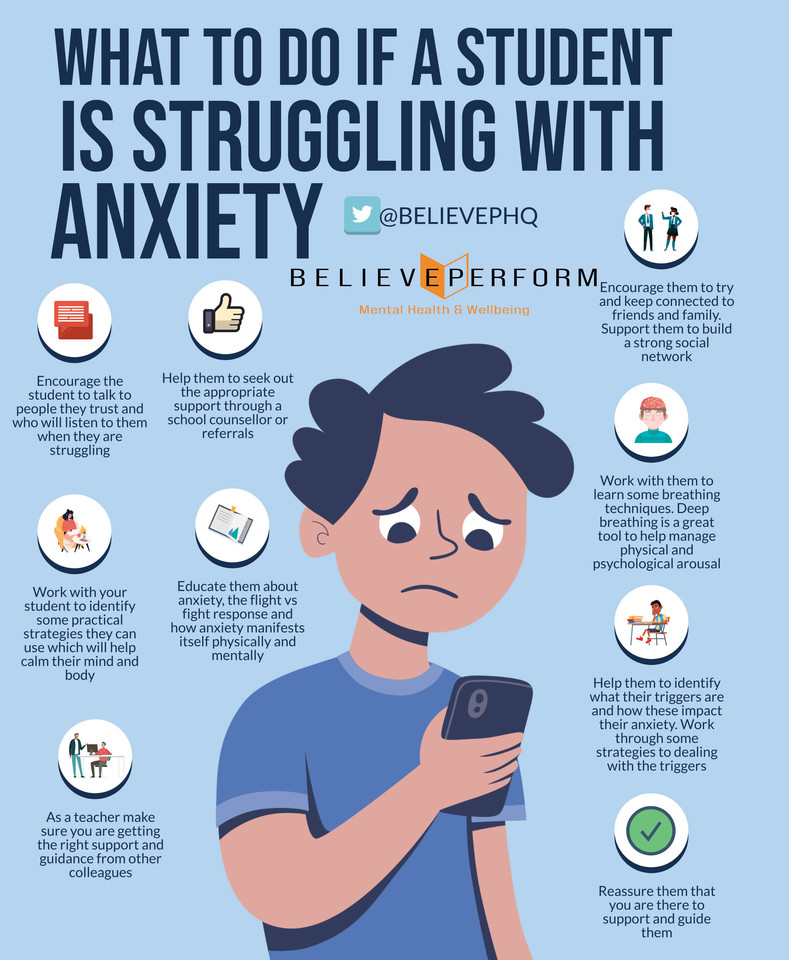
This image provides guidance on supporting students struggling with anxiety. It highlights strategies such as encouraging social connections, teaching breathing techniques, identifying triggers, and offering emotional support to help students manage their anxiety effectively.
A Collective Effort to Manage Exam Stress
Exams are an inevitable part of a student’s academic journey, but stress doesn’t have to be. Throughout this discussion, we have explored the causes, effects, and solutions for excessive exam pressure, emphasizing that exam stress, when left unchecked, can take a serious toll on mental, physical, and emotional well-being
A key takeaway from this discussion is that stress itself is not the enemy. In fact, research from Harvard University suggests that when students are taught to view stress as a challenge rather than a threat, their performance and confidence improve significantly. The real issue arises when stress becomes overwhelming and paralyzing, preventing students from reaching their potential.
It is also crucial to recognize that this is not just the student’s battle to fight alone. Parents, teachers, and even society as a whole play a significant role in shaping how students perceive academic pressure. By shifting the focus from mere performance to overall growth, parents and teachers can help create an environment where students feel safe, encouraged, and motivated to learn.
A study by the University of Cambridge found that students who received consistent emotional support from parents and teachers were 30% less likely to experience chronic stress and 25% more likely to perform better academically. This highlights an essential truth—when students feel supported, they thrive.
FAQs on Dealing with Exam Stress: When Pressure Becomes Too Much
What are the common signs of exam stress?
Common signs include anxiety, difficulty concentrating, irritability, headaches, trouble sleeping, loss of appetite, and feeling overwhelmed.
How does exam stress affect mental health?
Prolonged stress can lead to anxiety disorders, depression, burnout, and low self-esteem. It may also result in panic attacks and social withdrawal.
Why do students experience exam stress?
Students feel pressure due to high expectations from parents, teachers, or themselves. Fear of failure, time constraints, and competition also contribute to stress.
How can I manage my time better during exam preparation?
Create a realistic study schedule, prioritize important topics, take breaks, and avoid last-minute cramming. Using techniques like the Pomodoro method can help.
What are effective study techniques to reduce stress?
Active learning methods such as summarization, self-quizzing, and mind mapping improve retention. Practicing past papers and teaching concepts to others also help.
Can lack of sleep increase exam stress?
Yes, sleep deprivation affects memory, concentration, and decision-making, making it harder to retain information and increasing stress levels. Aim for 7-9 hours of sleep.
How does diet impact exam stress?
Eating a balanced diet with brain-boosting foods like nuts, fruits, and whole grains helps maintain energy and focus. Avoid excessive caffeine and junk food.
What role does exercise play in stress management?
Physical activity releases endorphins, which improve mood and reduce stress. Even a short walk or stretching exercises can help relieve tension.
How can relaxation techniques help with exam stress?
Practices like deep breathing, meditation, and progressive muscle relaxation calm the mind and improve focus, reducing stress levels.
What should I do if I experience anxiety before an exam?
Practice deep breathing, visualize success, stay positive, and avoid excessive last-minute studying. Arrive early and take a few moments to relax before the exam starts.
How can I stay motivated while preparing for exams?
Set achievable goals, reward yourself for progress, study with a friend for accountability, and remind yourself of the long-term benefits of doing well.
Is it okay to take breaks while studying?
Yes, taking short breaks improves focus and prevents burnout. The ideal break-to-study ratio is around 5-10 minutes of rest after 25-50 minutes of studying.
How can I deal with the fear of failure?
Shift your mindset to view exams as learning experiences rather than a measure of self-worth. Focus on effort and improvement rather than just results.
What should I do if exam stress becomes overwhelming?
Talk to someone you trust, like a teacher, counselor, or family member. Professional support can help if stress is affecting your daily life.
How can parents and teachers support students during exams?
They can provide encouragement, create a positive environment, avoid pressuring students, and help them develop healthy study habits.





